高考英语定语句大总结
- 格式:pptx
- 大小:1.14 MB
- 文档页数:7
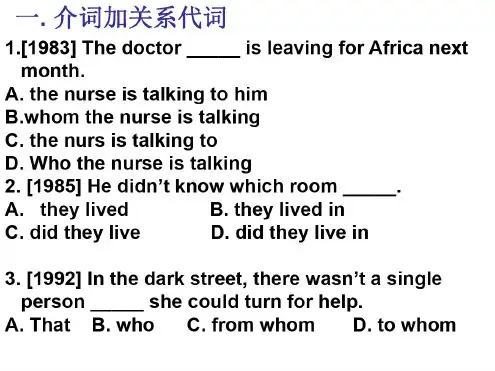
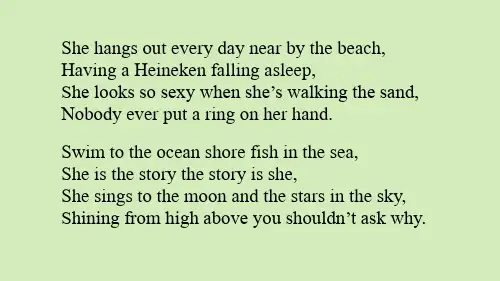
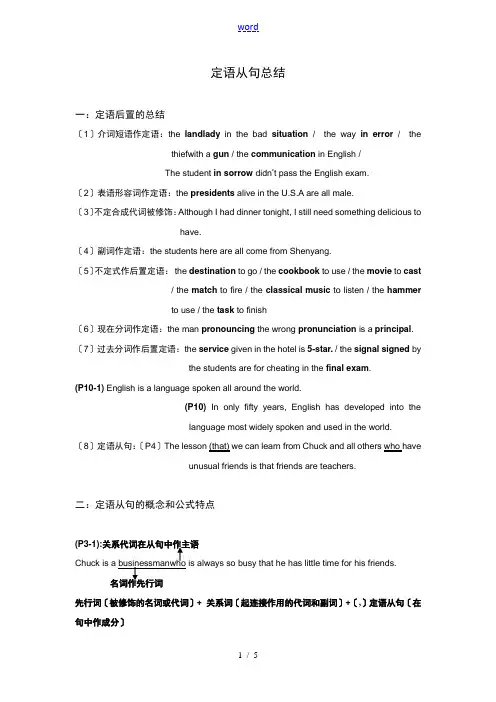
定语从句总结一:定语后置的总结〔1〕介词短语作定语:the landlady in the bad situation/ the way in error/ thethiefwith a gun / the communication in English /The student in sorrow didn’t pass the English exam.〔2〕表语形容词作定语:the presidents alive in the U.S.A are all male.〔3〕不定合成代词被修饰:Although I had dinner tonight, I still need something delicious tohave.〔4〕副词作定语:the students here are all come from Shenyang.〔5〕不定式作后置定语:the destination to go / the cookbook to use / the movie to cast/ the match to fire / the classical music to listen / the hammerto use / the task to finish〔6〕现在分词作定语:the man pronouncing the wrong pronunciation is a principal. 〔7〕过去分词作后置定语:the service given in the hotel is 5-star. / the signal signed bythe students are for cheating in the final exam.(P10-1) English is a language spoken all around the world.(P10) In only fifty years, English has developed into thelanguage most widely spoken and used in the world.〔8〕定语从句:〔P4〕The lesson (that) we can learn from Chuck and all others who haveunusual friends is that friends are teachers.二:定语从句的概念和公式特点(P3-1):关系代词在从句中作主语Chuck is a businessmanwho is always so busy that he has little time for his friends.先行词〔被修饰的名词或代词〕+ 关系词〔起连接作用的代词和副词〕+〔,〕定语从句〔在句中作成分〕三:定语从句的分类When I took the money from her grandfather, I looked back at the girl, who was giving me the prettiest, largest smile (that)I have ever seen.限定性定语从句和非限定性定语从句的区别1:限定性没有逗号,非有逗号。
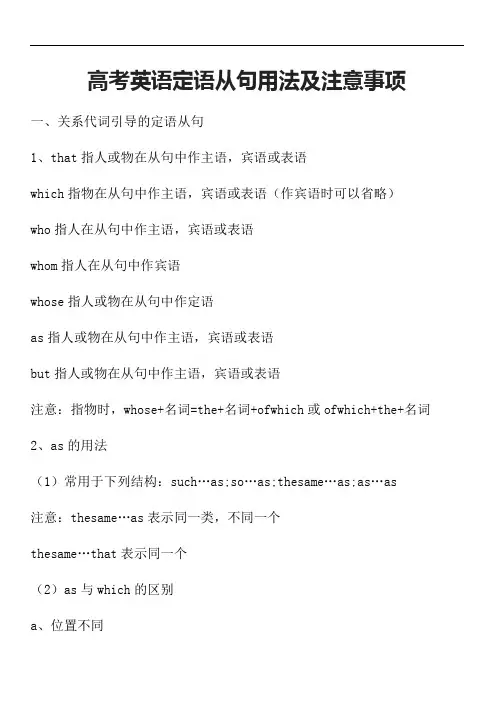
高考英语定语从句用法及注意事项一、关系代词引导的定语从句1、that指人或物在从句中作主语,宾语或表语which指物在从句中作主语,宾语或表语(作宾语时可以省略)who指人在从句中作主语,宾语或表语whom指人在从句中作宾语whose指人或物在从句中作定语as指人或物在从句中作主语,宾语或表语but指人或物在从句中作主语,宾语或表语注意:指物时,whose+名词=the+名词+ofwhich或ofwhich+the+名词2、as的用法(1)常用于下列结构:such…as;so…as;thesame…as;as…as注意:thesame…as表示同一类,不同一个thesame…that表示同一个(2)as与which的区别a、位置不同as可放在主句后,主句前或主句中间;which只能放在主句后。
b、as起连接作用,表达说话人的观点、看法,并指出主句内容的根据或出处,意为“正如,正像”。
Which相当于并列句,可以用andthis来代替,意为“这一点,这件事’”。
注意:as常用于下列结构:asweknow/asisknowntoall,asweallcansee,ashasbeensaidbefore/above, asmightbeexcepted,asisoftenthecase,一般不能用which代替as。
c、在从句中作主语时,which既可作系动词be的主语也可作实义动词的主语,而as只可作系动词be的主语。
二、只用that不用which的情况1、先行词为all,much,everything,nothing,something,anything,nothing,none,theo ne等不定代词时。
2、先行词被only,any,few,little,no,all,just,very,right等修饰时。
3、当先行词是最高级或被形容词最高级修饰时。
4、当先行词是序数词或被序数词修饰时。
5、当先行词是数词时。
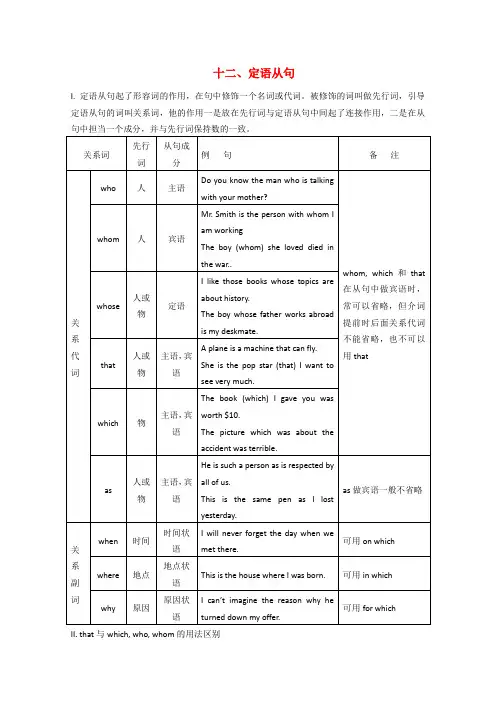
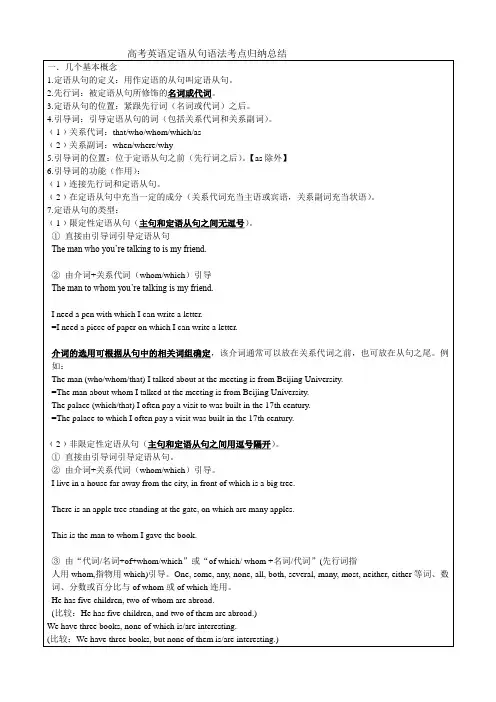

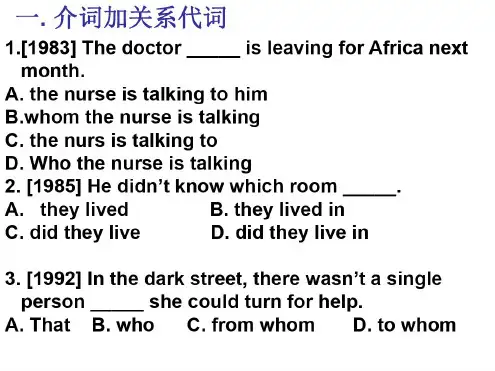
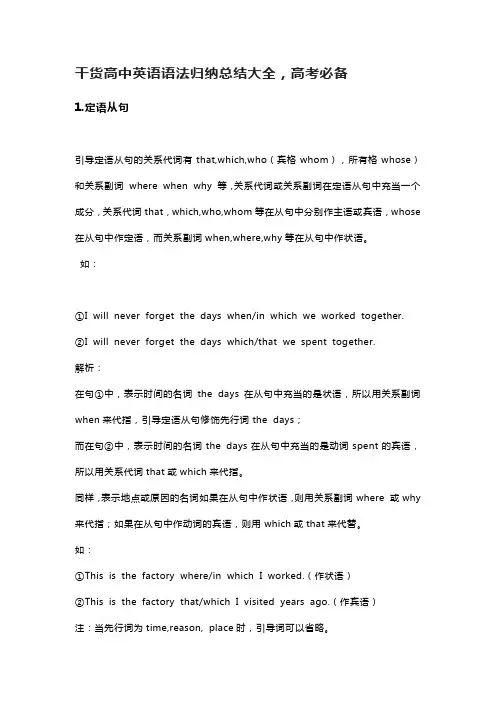
干货高中英语语法归纳总结大全,高考必备1.定语从句引导定语从句的关系代词有that,which,who(宾格whom),所有格whose)和关系副词where when why 等,关系代词或关系副词在定语从句中充当一个成分,关系代词that,which,who,whom等在从句中分别作主语或宾语,whose 在从句中作定语,而关系副词when,where,why等在从句中作状语。
如:①I will never forget the days when/in which we worked together.②I will never forget the days which/that we spent together.解析:在句①中,表示时间的名词the days在从句中充当的是状语,所以用关系副词when来代指,引导定语从句修饰先行词the days;而在句②中,表示时间的名词the days在从句中充当的是动词spent的宾语,所以用关系代词that或which来代指。
同样,表示地点或原因的名词如果在从句中作状语,则用关系副词where 或why 来代指;如果在从句中作动词的宾语,则用which或that来代替。
如:①This is the factory where/in which I worked.(作状语)②This is the factory that/which I visited years ago.(作宾语)注:当先行词为time,reason, place时,引导词可以省略。
①This was the first (when/what) I had serious trouble with my boss.②That is the reason (why) I did it.③This is the place (where) we met yesterday.另外,定语从句中谓语动词的数应与先行词的数相一致。
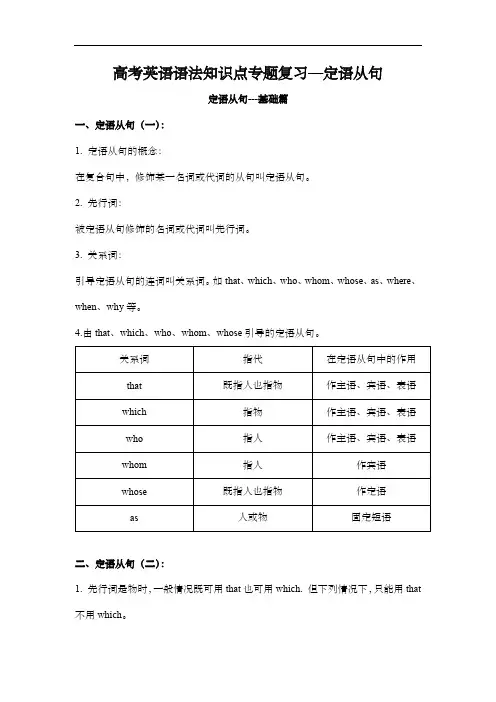
高考英语语法知识点专题复习—定语从句定语从句---基础篇一、定语从句(一):1. 定语从句的概念:在复合句中,修饰某一名词或代词的从句叫定语从句。
2. 先行词:被定语从句修饰的名词或代词叫先行词。
3. 关系词:引导定语从句的连词叫关系词。
如that、which、who、whom、whose、as、where、when、why等。
4.由that、which、who、whom、whose引导的定语从句。
二、定语从句(二):1. 先行词是物时,一般情况既可用that也可用which. 但下列情况下,只能用that 不用which。
1). 当先行词为指物的不定代词,如all、everything、something、anything、nothing、none、the one等时,只能用that。
There is nothing ______ I can do for you.2). 当先行词被the only、the very、the last、all、no、little等词修饰时,只能用that。
This is the very book ______ I’m looking for.3). 先行词被序数词修饰时,只能用that。
This is the first textbook ______ I studied in the middle school.4). 先行词为最高级或被最高级修饰时,只能用that。
This is the most beautiful mountain ______ I have ever seen.=I have _____ seen _____ a beautiful mountian.5). 先行词既有人也有物时,只能that。
He told us many interesting things and persons _______ we had.2. 先行词是物时,一般情况既可用that也可用which. 但下列情况下,只能用which不用that。

高考英语定语从句100句1. The man who talked to you just now is an engineer. 刚才和你说话的那个人是一位工程师。
2. This kind of book is for children whose native language is Chinese. 这种书是供母语是汉语的儿童看的。
3. I enjoyed the evening that we spent together by the sea. 我们一起在海边度过的那个晚上,我过得很愉快。
4. Here is the pen that you lost the day before yesterday. 这是你前天丢失的那支笔。
5. He is the person I met in the park yesterday. 他就是我昨天在公园里遇到的那个人。
6. The book you need is sold out. 你需要的那本书售完了。
7. The lady who came to our class is from Australia. 那位来过我们班的女士来自澳大利亚。
8. The man who shook hands with our teacher just now is Li Lei’s father. 刚才和我们老师握手的那个人是李雷的父亲。
9. I’ll never forget the summer holiday I spent with you. 我将不会忘记和你一起过的那个暑假。
10. She is one of the students in our class who are good at English. 她是我们班上英语很好的学生之一。
11. He’s the only one of my friends who comes from a foreign country. 他是我唯一一个来自外国的朋友。
高考英语语法考点归纳总结:高考英语语法:定语从句关系代词引导的定语从句一.关系代词的用法: 关系代词指代先行词在定语从句中作主语在定语从句中作动词的宾语或者介词的宾语, 介词在后指人that / whothat / who / whom指物that / whichthat / which上表中黑框内的关系代词可以省略; 在口语及非正式文体中whom常被who所替代; 另外, 关系代词whose表示 (先行词)的二.示例:1.关系代词在定语从句中作主语a. Do you know the man that / who came to see Xiao Yang this morning ?b. This is a book that / which tells about space rocket.2.关系代词在定语从句中作动词的宾语a. The comrade ( that / who / whom ) they came to visit is a scientist.b. I will never forget the day ( that / which ) we spent in the countryside.3.关系代词在定语从句中作介词的宾语, 介词在后a. This is the house ( that / which ) he was born in.b. The person ( that / who / whom ) you should write to is Mr Ball.c. The man ( that / who / whom ) you talked with is our English teacher.4.whose引导的定语从句a. I know a lady whose husband is a Nobel Prize winner.b. The child whose mother died in the fire is now an engineer in our company.c. He is living in a house whose windows are painted white.三.应注意的问题:1.指物时, 关系代词只用that而不用which的情况:①.先行词被最高级或the only, the very, the same等修饰时a. This is the best play that was written by Jack.b. He is the only person that I can trust.②.先行词被序数词或the last等词修饰时a. This is the first car that arrived this morning.③.先行词为all, everything, nothing, something, anything等不定代词时或被不定代词all, any, no等修饰时a. All the people that come from the country work much harder.b. This is all that I can tell you.④.人+动物或事物共同作为先行词时a. My father and Mr Brown talked of things and persons that they remembered for about an hour.⑤.句中又有which作为疑问词出现时a. Which is the train that goes to Beijing ?2.关系代词who, which, that在定语从句中作主语时, 要注意定语从句中的主谓一致问题. 因为who / that / which指代先行词, 所以定语从句的谓语与先行词保持一致即可a. I came to get the book that was left in the classroom.b. I came to get the books that were left in the classroom.关系副词引导的定语从句一.关系副词的用法: when在定语从句中作地点状语; where在定语从句中作地点状语; why 在定语从句中作原因状语二.示例:a. He was well at the time when I saw him.b. Let’s meet at the place where we met yesterday.c. This is the reason why I am in favor of the singer.三.应注意的问题:1.在某些表示时间的名词后的关系副词可省略, 这样的名词如: the time, every time, each time, the moment, the minute, the second等 (也有语法家认为是这些名词直接引导了时间状语从句)a. By the time ( when ) he was fourteen years old he had learned much English.介词+关系代词引导的定语从句一.说明: 关系代词在定语从句中作介词的宾语时, 介词可以位于关系代词之前, 从而构成介词+关系代词引导的定语从句二.这种定语从句中关系代词的用法: 在这种定语从句中, 关系代词只能用whom(指人)和which(指事物), 而不能使用that / who三.示例:a. This is the house in which he was born.b. The person to whom you should write is Mr Ball.c. The man with whom you talked is our English teacher.d. The gentleman, with whose daughter I worked, looked down upon woman.四.应注意的问题:1.关系代词前的介词可以是单个介词, 也可以是短语介词或类似短语介词的词组a. This is the house in which he was born.b. At five o’cloc k we reache d the house, in front of which there is a big tree.c. At five o’clock we reached the mountain, at the foot of which lie some farmhouses.2.根据表达的需要, 介词之前还可以有其他词, 从而构成名词或代词+介词+关系代词引导的定语从句a. I used to live in a small room, the window of which faces the street.b. At the gate stood a group of students, some of whom are girls.3.介词若为短语动词中的介词, 则不可将介词拆开放在关系代词之前a. This is the magazine whic h you are looking for.( for不能放在which之前)b. The child whom Aunt Li takes care of is ill.( of不能放在whom之前)4.关系副词when / where / why常可与介词+关系代词互换a. Do you remember the days when we were in Beijing? ( =in which we were in Beijing )b. Do you remember the park where we once played for a whole day?( =in which we once played for a whole day )c. This is the reason why he was absent yesterday. (= for which he was absent )限定性与非限定性定语从句一.两者的区别: 见下表形式作用译法限定性定语从句无逗号与主句分开修饰限定作用, 即不可缺少的定语其译文常位于先行词之前, 并体现的非限定性定语从句有逗号与主句分开附加、补充说明的作用, 若缺少它, 句意仍然完整常将其译成一个和主句并列的分句二.关系词的用法: 非限定性定语从句不能用that引导, 并且关系词在任何情况下都不能省略, 除此之外, 在关系词的使用上, 非限定性定语从句与限定性定语从句完全相同三.示例:a. My book, which is very old, is on the table.b. President Kennedy, who had heard of King before, was interested to meet him.c. His father, who is working in Beijing, is an engineer.d. The house, where he was born, has been destroyed in the earthquake.e. Mr. Smith, with whom you just talked, is our English teacher.f. The gentleman, with whose daughter I worked, looked down upon woman.四.应注意的问题:1.as / which都可以引导一个非限定性定语从句, as / which是关系代词, 指代主句中所提到的某种情况, 它们的不同点是:①.as引导的这种定语从句位置比较灵活, 可位于句首, 句中, 句尾; 但which引导的这种定语从句只能位于主句之后②. as还带有正如, 正象之意, 而which不含此意a. The earth is like a ball, as everyone knows.b. As everyone knows, the earth is like a ball.c. They said they were French, which wasn’t true.常见问题一.定语从句还原法: 试题中有很多有关定语从句的, 这类题往往需选择引导词部分. 做好这类题的关键首先是要有这样的观念: 定语从句应有完整而合理的句子成分. 基于这一点, 我们可以用还原法来检验定语从句是否正确, 即把定语从句还原成为一个简单句. 具体做①.第一步: 替换. 将关系代词直接替换成先行词, 如果是关系副词, 先替换成介词+关系代词, 再将关系代词替换成先行词②.第二步: 调整, 即调整语序, 看能否构成一个合理的简单句例如, 还原以下例句a中的定语从句的过程是: 先将that / which替换成先行词the park, 再调整语序, 就能得到一个合理的简单句: We visited the park last year. 再如, 还原以下例句b中的定语从句的过程是: 先将where替换成in which, 再将which替换成先行词the park, 再调整语序, 就得到一个合理的简单句: We once played for a whole day in the park.a. Do you remember the park that / which we visited last year?b. Do you remember the park where we once played for a whole day?c. Do you still remember the days that / which we spent together ?d. Do you still remember the days when we were together?二.分隔定语从句: 定语从句一般紧跟在先行词之后, 但有时也被分隔开来, 在阅读时要注意根据定语从句所表达的意思来分辨先行词是什么a. I was the only person in the office who was invited.b. He was the only o ne of the students who passed the GRE.①.as引导的这种定语从句位置比较灵活, 可位于句首, 句中, 句尾; 但which引导的这种定语从句只能位于主句之后②. as还带有正如, 正象之意, 而which不含此意a. The earth is like a ball, as everyone knows.b. As everyone knows, the earth is like a ball.c. They said they were French, which wasn’t true.常见问题一.定语从句还原法: 试题中有很多有关定语从句的, 这类题往往需选择引导词部分. 做好这类题的关键首先是要有这样的观念: 定语从句应有完整而合理的句子成分. 基于这一点, 我们可以用还原法来检验定语从句是否正确, 即把定语从句还原成为一个简单句. 具体做①.第一步: 替换. 将关系代词直接替换成先行词, 如果是关系副词, 先替换成介词+关系代词, 再将关系代词替换成先行词②.第二步: 调整, 即调整语序, 看能否构成一个合理的简单句例如, 还原以下例句a中的定语从句的过程是: 先将that / which替换成先行词the park, 再调整语序, 就能得到一个合理的简单句: We visited the park last year. 再如, 还原以下例句b中的定语从句的过程是: 先将where替换成in which, 再将which替换成先行词the park, 再调整语序, 就得到一个合理的简单句: We once played for a whole day in the park.a. Do you remember the park that / which we visited last year?b. Do you remember the park where we once played for a whole day?c. Do you still remember the days that / which we spent together ?d. Do you still remember the days when we were together?二.分隔定语从句: 定语从句一般紧跟在先行词之后, 但有时也被分隔开来, 在阅读时要注意根据定语从句所表达的意思来分辨先行词是什么a. I was the only person in the office who was invited.b. He was the only one of the students who passed the GRE。
高考英语之定语从句专项知识点高考英语考试你希望考多少分呢?如果你想要取得高分,现在就来坦途高考网学习吧,这里为大家分享了相应的知识点内容,相信可以帮助到你。
定语从句(Attributive Clauses)在句中做定语,修饰一个名词或代词,有时也可以修饰部分或整个句子。
被修饰的名词,词组或代词即先行词。
定语从句通常出现在先行词之后,由关系词(关系代词或关系副词)引出。
关系代词有:who, whom, whose, that, which, as。
关系副词有:when, where, why, how。
关系代词和关系副词放在先行词和定语从句之间,起连接作用,同时又可做定语从句的一个成分。
当关系代词做宾语时可以省略。
定语从句中的谓语动词必须在人称上和数量上和先行词保持一致。
定语从句分为限制性定语从句和非限制性定语从句。
关系代词引导的定语从句1) who, whom, that 这些词代替的先行词是人的名词或代词,在从句中所起作用如下:Is he the man who/that wants to see you?(who/that在从句中作主语)He is the man whom/ that I saw yesterday.(whom/that在从句中作宾语)2) whose 用来指人或物,(只用作定语,若指物,它还可以同of which互换).例如:Please pass me the book whose (of which) cover is green.3) which, that 它们所代替的先行词是事物的名词或代词,在从句中可作主语、宾语等.例如:A prosperity which / that had never been seen before appears in thecountryside.(which / that在句中作宾语)The package (which / that) you are carrying is about to comeunwrapped.(which / that在句中作宾语)关系代词that和which 都可以指物,that 和Who 都可以指人,其用法区别:不用that的情况:a) 在引导非限定性定语从句时(错)The tree, that is four hundred years old, is very famous here.b) 介词后不能用We depend on the land from which we get our food.c) 多用who 的情况①关系代词在从句中做主语A friend who helps you in time of need is a real friend.②先行词为those, people 时Those who were either fools or unfit for their offices could not seethe cloth.③先行词为all, anyone, ones, one 指人时One who doesn't work hard will never succeed in his work.④在There be句型中There is a stranger who wants to see you.⑤在被分隔的定语从句中A new teacher will come tomorrow who will teach you German.⑥在有两个定语从句的句子中,其一用who,其二用that,但若先行词后接两个以上的并列定语从句时,后一个必须重复前一个关系代词。